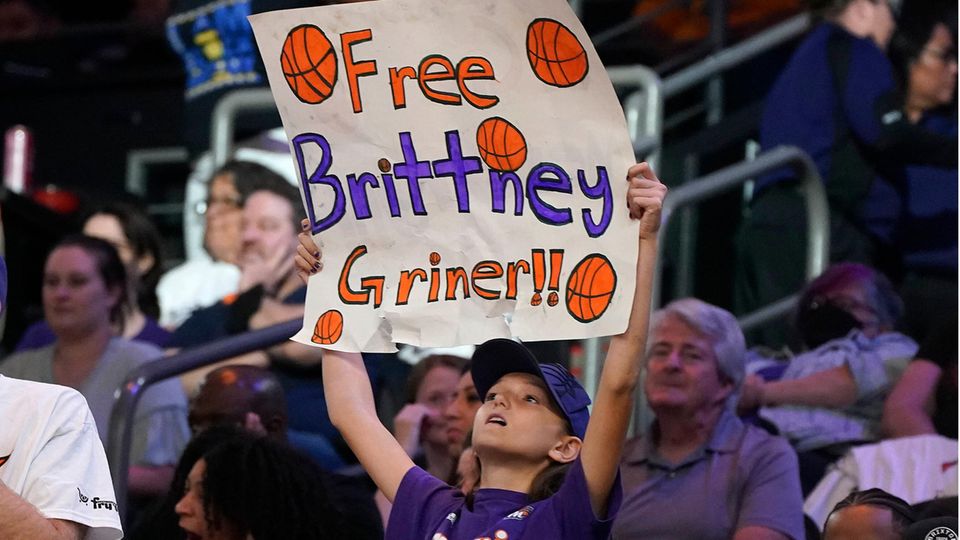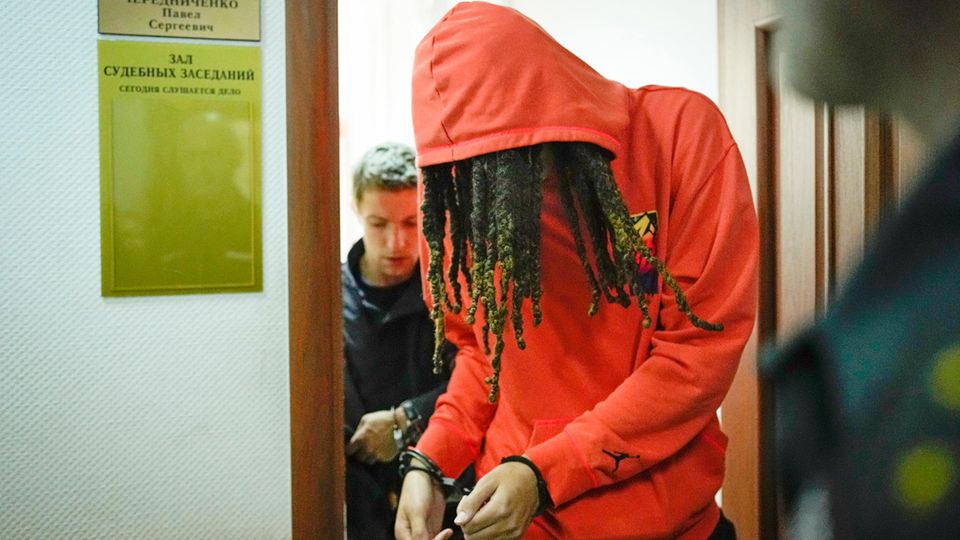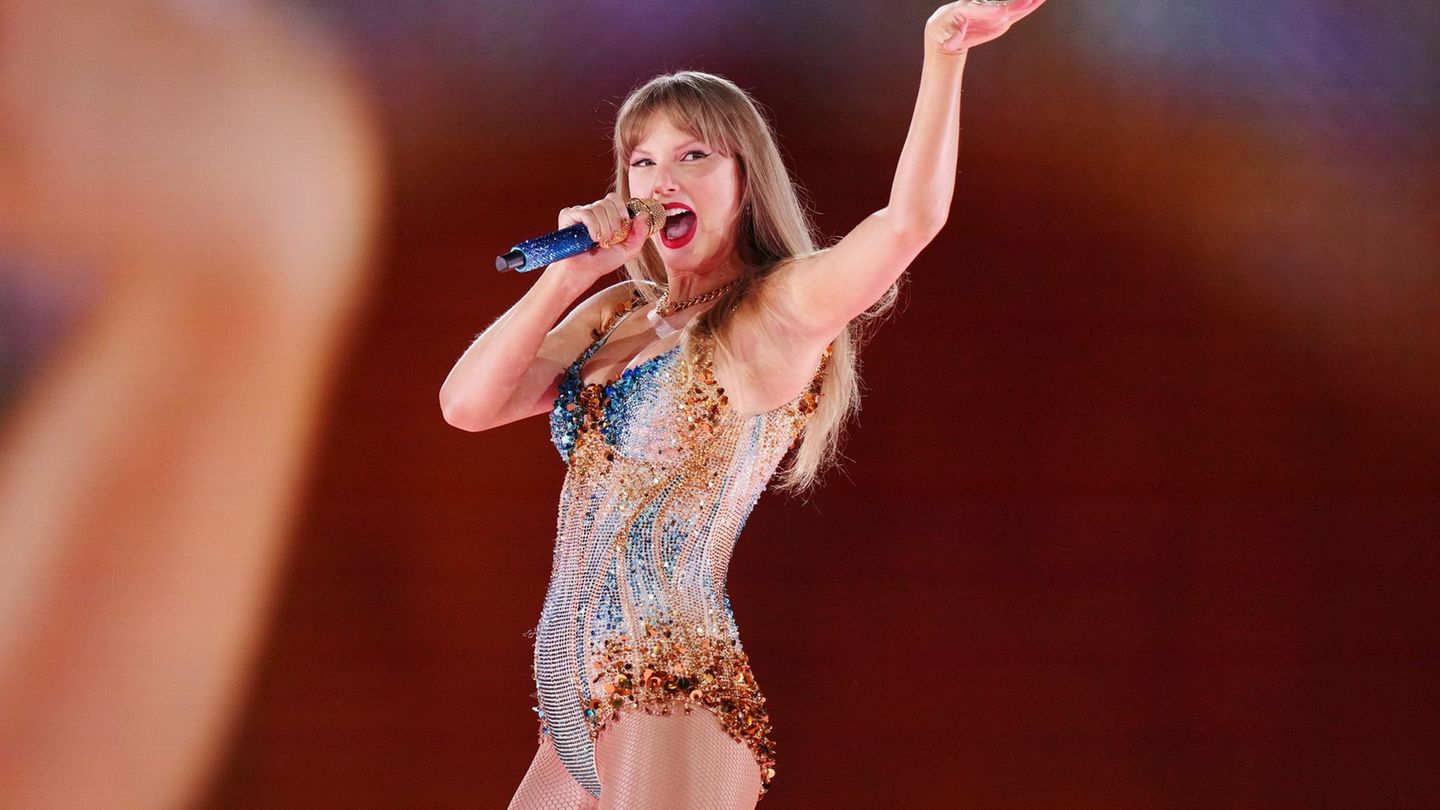It is a nerve thriller for the relatives: Brittney Griner has been in custody in Russia for four months. The basketball superstar is accused of drug possession, the US government sees Griner as wrongly imprisoned. Griner, who is well versed on the ball himself, has become the plaything of the major political powers.
Brittney Griner is the greatest. Physically anyway, with a height of 2.06 meters, the basketball player towers over the other athletes on the field. The 31-year-old is also considered one of the best and most versatile players in the USA. A championship title in the women’s professional league WNBA, two-time Olympic champion and world champion, as well as numerous awards as best defender and best points collector and appointments to the all-star team. But Griner missed the start of the new season in the WNBA in early May – she has been in prison in Russia for almost four months now. The charge: drug possession. The possible consequences: Five to ten years imprisonment.
After little was made public about the arrest of the superstar in the USA for a long time, the debate about the 31-year-old is now picking up speed. It was only made public two weeks after her arrest on February 17. Players and those responsible for the otherwise very political WNBA were reluctant to comment – so as not to intervene in the case on the advice of the authorities. Within a very short time, the arrest has turned into a political issue in which US politicians have also become involved and are increasing the pressure on the authorities in Moscow.
What exactly happened on February 17 at Sheremetyevo Airport in northern Moscow is unclear. It is clear that Griner wanted to play for UMGK Yekaterinburg during the WNBA break – a season in the US league only lasts about four months. Just as she has been doing since 2014 – according to her wife Cherelle, 2022 should be the last season in Russia. The fact that Griner plays basketball in Russia is not only for sporting reasons, but above all a financial one. While in the WNBA she earns the league’s maximum gross salary of $228,000 (around €217,000) per season, in Russia it’s around one million dollars (€950,000) net. But at the customs control in Moscow there was an incident. According to Russian customs, Griner’s luggage contained cannabis oil intended for consumption. In Phoenix this is allowed, but in Russia there are severe penalties for cannabis possession.
Brittney Griner: US condemns arrest in Russia
Because of the Russian war of aggression in Ukraine, Griner has long since become a political pawn between Russia and the USA – especially since the start of the war and the sanctions from the West are anything but conducive to Griner’s situation. It was not until more than two months after her arrest that the US State Department declared that Griner was being wrongly held. Since then, Roger Carstens, President Joe Biden’s special representative for hostage affairs, has been in charge of the case – but she is not considered a hostage by the ministry, it said in a statement. However, Carsten’s appointment is a sign that the United States is intensifying efforts to secure his release.
The statement was a kind of kick-start for the WNBA and other sports professionals to get public and loud. On every field in the league is the slogan “BG42”, a reference to Greiner’s initials and shirt numbers. There are tons of posts on social media tagged with the hashtags #BG42 or #FreeBrittneyGriner. Male basketball superstars like LeBron James, Steph Curry and Chris Paul are campaigning for a release and using their reach to draw attention to the situation. Griner’s wife Cherelle increased the pressure on politics in a television interview with ESPN, her first public statement three months after Griner’s imprisonment: “One day our president will wake up and see that this is a big deal and he has to act.” You have already requested a meeting with Biden. “I know every second that BG is not here and I just want them back by my side.
Almost nothing has been heard from Griner himself in the past four months. Sports site ESPN reported in early June that the 31-year-old was allowed to respond to emails and letters with letters. However, the messages to the basketball player reached her only sporadically and after Russian officials checked them beforehand. “We don’t want her to think she’s been forgotten,” said Stefanie Dolson, center at New York Liberty. Just like Dolson, hundreds of other players and those responsible have now sought contact with Griner – some with supportive words, others with personal content and others in turn sent sudokus to pass the time. Her wife, Cherelle, has also not been able to speak to Brittney Griner for four months. “I’m in a very vulnerable position right now. I have to trust people that I didn’t know before February 17,” she said in an interview with ESPN. She doesn’t know how she’s doing or what she’s doing in captivity and has to trust the lawyer’s statements, Cherelle Griner explained.

The case also contains explosives for the social situation in the USA. Because Griner is not the only prominent detainee from the USA in Russia. Paul Whelan, a US police officer, has been in a Russian prison for two years. He was sentenced to 16 years in prison on charges of espionage. Here, too, the USA is committed to the release of Whelan, if only one of the two – a homosexual black man or a white man – comes back to the USA, this is likely to further divide the already far apart society.
Prisoner swap with Russian arms dealer
A prisoner swap is currently being discussed in the Russian state media. According to the Russian state agency TASS, the focus of Russian interest is on arms dealer Viktor Bout. But, once described as the “dealer of death” by British Minister Peter Hain, was arrested in Thailand in 2008 and extradited to the United States – the UN had also requested But’s extradition to the International Court of Justice in The Hague – and there in 2012 to 25 years sentenced to imprisonment. Much to the annoyance of the Kremlin, which for its part insists on illegal imprisonment. Sergey Lavrov, then as now Russian Foreign Minister, described the verdict as politically motivated and announced that he would do everything to bring Bout back to Russia. Paul Whelan’s brother David confirmed in a conversation with radio station NPR at the end of April that Russian interest in Bout has not dried up. According to David Whelan, his brother was told shortly after his arrest that he was to be used for a prisoner swap with But.
Meanwhile, Griner cannot hope for leniency from the Russian judiciary. A cautionary example is the verdict against former US diplomat Marc Fogel on Friday. He was sentenced to 14 years in prison by a court in Khimki for “large-scale drug smuggling”. Like Griner, he was arrested at Sheremetyevo Airport in August 2021 for drug possession – his luggage is said to have contained eleven grams of marijuana and eight grams of cannabis oil. Fogel said he was prescribed the marijuana after back surgery in the United States, but he didn’t know that Russia doesn’t allow the drug to be used medicinally. According to Russian authorities, Fogel enjoyed diplomatic immunity as an employee of the US Embassy in Moscow until May 2021.
But not only the verdict against Fogel shows how merciless the Russian courts are. According to the Federal Agency for Civic Education (BPB), almost 90 percent of cases are brought to court. Less than one percent of court cases end in acquittal. The special procedures used in Russia have been criticized. In 71 percent of the court cases, the accused confess in the hope of a lenient sentence. According to the BPB, a judgment is often only made on the basis of the confession, but the judgment cannot be appealed. Long and hard pre-trial detention is used as a means of pressure on the accused, with the aim of persuading the detainees to confess. Brittney Griner has also been in custody for four months, this was extended again last Wednesday – until July 2nd. Perhaps even more worryingly, the US State Department was unaware of the extension: they only found out about the extension through media reports.
Sources: , , , , , , , ,
Source: Stern
I have been working in the news industry for over 6 years, first as a reporter and now as an editor. I have covered politics extensively, and my work has appeared in major newspapers and online news outlets around the world. In addition to my writing, I also contribute regularly to 24 Hours World.




